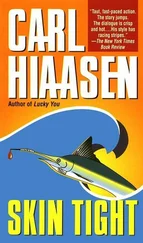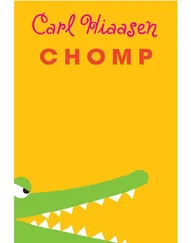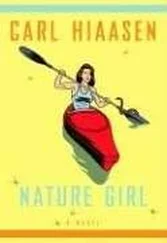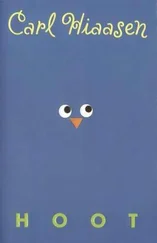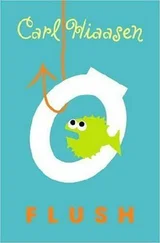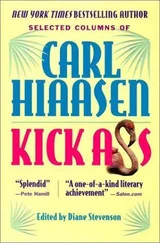Carl Hiaasen - A Death in China
Здесь есть возможность читать онлайн «Carl Hiaasen - A Death in China» весь текст электронной книги совершенно бесплатно (целиком полную версию без сокращений). В некоторых случаях можно слушать аудио, скачать через торрент в формате fb2 и присутствует краткое содержание. Жанр: Детектив, на английском языке. Описание произведения, (предисловие) а так же отзывы посетителей доступны на портале библиотеки ЛибКат.
- Название:A Death in China
- Автор:
- Жанр:
- Год:неизвестен
- ISBN:нет данных
- Рейтинг книги:3 / 5. Голосов: 1
-
Избранное:Добавить в избранное
- Отзывы:
-
Ваша оценка:
- 60
- 1
- 2
- 3
- 4
- 5
A Death in China: краткое содержание, описание и аннотация
Предлагаем к чтению аннотацию, описание, краткое содержание или предисловие (зависит от того, что написал сам автор книги «A Death in China»). Если вы не нашли необходимую информацию о книге — напишите в комментариях, мы постараемся отыскать её.
A Death in China — читать онлайн бесплатно полную книгу (весь текст) целиком
Ниже представлен текст книги, разбитый по страницам. Система сохранения места последней прочитанной страницы, позволяет с удобством читать онлайн бесплатно книгу «A Death in China», без необходимости каждый раз заново искать на чём Вы остановились. Поставьте закладку, и сможете в любой момент перейти на страницу, на которой закончили чтение.
Интервал:
Закладка:
"These are the biggest we could find, Thom-as. But you will never be a peasant.
Come, let the people see their new rice expert."
Along the river there was a kind of promenade, a path of beaten earth flanked by shade trees. Stratton smiled at the peasants they met and tried to look knowledgeable.
"This is the end of Bright Star," said Kangmei. "Over there is Evergreen."
She gestured to the far side of the brown river, flanked on both sides by steep banks. The water flowed swiftly and looked deep.
"And beyond Evergreen is Man-ling, right?"
"Yes." She led Stratton to a spot where the promenade had been widened to include a graceful copse of palms. He sat beside her.
"This looks to me like Bright Star's lovers' lane," Stratton remarked.
"I do not understand."
When he had explained she smiled.
"It is true that many young people come here at night and that they do not always discuss politics."
They kissed.
And then she asked the question that Stratton had dreaded.
"Why are you afraid of Man-ling, Thom-as?"
It was not so much that she deserved to know. To his surprise, Stratton discovered that he wanted to tell her.
"I was there once. In a war. While you were a child."
She sat quiet for a time, tracing circles in the dirt with a stick. Stratton stared down at the river.
"Was it very sad, Thom-as?"
"Yes."
"I would like to know." She spoke to the stick.
He told her.
March 18, 1971 A black sergeant in plainclothes had brought the summons to the Saigon villa Stratton shared with Bobby Ho. An hour later, they were in a briefing room protected by concentric circles of invisible guards.
A squat, sweat-stained colonel abandoned an uneven struggle with a balky room air conditioner.
"Captain Black," the colonel said, shaking hands with Stratton.
"Captain White. Congratulations." The colonel gave Bobby Ho's hand an extra pump. He had been a captain only for six days, but no one outside the room was even supposed to know that Bobby Ho was in the army. Deniability, they called it. Officially, Stratton and Ho were civilian psychologists on contract to the government: studying stress.
"Rested up? Everybody's talkin' about it."
On the last one they had been close enough to see the lights of Hanoi.
"This one should be even more fun." He passed across aerial photos. "The Chinks are involved in this little old war, up to their slanty assholes."
"Who is that, Colonel?" Bobby Ho asked quietly. Stratton stifled a grin. Bobby Ho's parents ran a pawnshop in San Francisco. They had raised their son to be an American, but there was no way you could tell by looking at him. Vietnam had intercepted Bobby Ho between Stanford and medical school. He wanted to be a pediatrician, and he spent a lot of his time and most of his money working with some French nuns who ran a clinic near the village. When the army made him White for missions that didn't exist to places that were never named, Bobby Ho hunted with uncommon skill.
The colonel had the grace to color.
"The Chinese. The Chinese are teachin' the Viets how to brainwash our boys.
Remember what they did in Korea? I was there, man. The last thing you wanted to happen was to get captured by the Chin-Chinese. They turned people inside out; tell you Ike was a faggot and make you believe it."
The colonel poked a pudgy finger at the aerial photos.
"What we hear is that the Chinese are trainin' Viet interrogators in that building there in the middle of the picture. They got about a dozen of our POWs up there as guinea pigs."
"Where is it-the village?" Stratton asked.
"Jesus, I just told you. It's in China."
"Shit," said Bobby Ho.
"We supposed to go in and get them?" Stratton asked.
The colonel nodded. "Yeah, go get 'em out and fuck Chairman Mao. Does that offend you, Captain White?"
"Not a bit, Colonel," said Bobby Ho.
"What's the name of this place?" Stratton asked.
"Man-ling it's called. You guys see Joe and the boys. They got it all worked out, pictures, models, the whole shootin' match, just like usual." The colonel's eyes assumed a faraway cast. "If it was me, I'd take about four gunships and hit 'em so hard and so fast they wouldn't have time even to find their little red books. That's the only way to win this war, hard and fast. That's how I'd do it, if it was me."
Hot air. Stratton would write the operational orders and the colonel knew it.
"If it was you, I'd stay home," said Bobby Ho.
They took one chopper off a quiet carrier high up in the Gulf of Tonkin.
Stratton, Ho and four sergeants. Captain Black was traveling light. If he needed help, it was only minutes away in the air behind them.
For a landing zone, Stratton had chosen a paddy about three miles east of the village. He had wanted the farmland and the village between the chopper and the PLA camp that lay a few miles to the west. Intelligence said a regular infantry company used the camp. Intelligence had not said why it believed the nowhere village called Man-ling had been chosen to brainwash POWs.
They landed in driving rain and gusting wind, ankle-deep in water-killers dressed for the country in dark, rough civilian clothes without nationality. In the distance, at night, they might pass for peasants. Close up it would be harder. Stratton's peasants bore a Russian AK-47, Chinese grenades, a silenced East German pistol, a Thai killing knife and a cyanide capsule. On his back, each man carried a folding bicycle. They looked superficially like Chinese machines, but were half as heavy and twice as fast. Stratton had insisted. A question of image: See a man on a bicycle and you assume he lives nearby and knows where he is going. He belongs.
The same reasoning had ordained the timing. It was midnight, and the helicopter would return one hour before dawn unless Stratton called earlier. They might have come later, but anything moving in the Chinese countryside between midnight and dawn would alarm sentinels accustomed to seeing nothing move at all. Even midnight was cutting it fine, Stratton knew, but he had not dared come until the village was asleep.
They watched in silence as the chopper clawed for the clouds on muffled engines.
It was the seventh time Stratton had endured that particular parting. The seven loneliest moments of his life.
Even in the mud, the bicycles worked like a charm.
They were the only thing.
A sentry materialized, wraithlike, from the shelter of a tree about a mile from the village. PLA.
The sentry hollered something that was lost in the wind. Bobby Ho, riding point, head down, waited until he was within ten yards of the man, until the pistol would bear. He answered in Chinese.
Maybe the man had heard the helicopter. Maybe Bobby Ho said the wrong thing. The sentry coiled, unslinging his rifle. From their shelter by the tree, two more wet soldiers emerged. The six Americans slithered off their bikes into the mud like a satanic rank of marionettes.
It ended quickly, but one of the sentries managed a single shot. It ricocheted like flat doom through the blackness.
For five breathless, unbearable minutes, Stratton's team crouched by the road, safeties off, ears aching, praying. No one came. The sentry had died in vain.
Bobby Ho tried to break the tension.
"These Chinks ain't even tryin'," he whispered in jocose mimicry of the fat colonel. It didn't sound funny.
The single guard at the head of the village main street died in silence for his sloth. He must have felt the blade administered by a saturnine Puerto Rican named Gomez, but he never saw it. Stratton left Gomez and a fireplug Tennessean named Harkness to watch their back door.
They met the boy a few minutes later, creeping through such stillness and total absence of color it gave Stratton the eerie sensation that the entire village was a two-dimensional fantasy.
Читать дальшеИнтервал:
Закладка:
Похожие книги на «A Death in China»
Представляем Вашему вниманию похожие книги на «A Death in China» списком для выбора. Мы отобрали схожую по названию и смыслу литературу в надежде предоставить читателям больше вариантов отыскать новые, интересные, ещё непрочитанные произведения.
Обсуждение, отзывы о книге «A Death in China» и просто собственные мнения читателей. Оставьте ваши комментарии, напишите, что Вы думаете о произведении, его смысле или главных героях. Укажите что конкретно понравилось, а что нет, и почему Вы так считаете.

